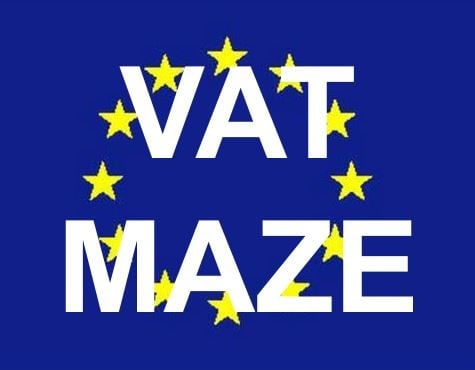As from January 1st, 2015, European Union online businesses will now have to cope with the regions’ even more incredibly complicated VAT (value added tax, sales tax) system.
Value added tax is a type of indirect taxation, taxes imposed on things we spend our money on, as opposed to direct taxation, which is levied on our wages, company profits, and assets.
Hundreds of thousands of firms, including “kitchen table” online entrepreneurs will be affected, including those selling music downloads, online auctions, anti-virus software, gaming, electronic books, knitting patterns and other digital products.
The VAT legislation labyrinth is so complicated and confusing that tiny businesses are unlikely to know what to do without paying expensive qualified accountants to do their books.
Critics say the additional financial and time-consuming costs involved in sorting out the new paperwork and hiring professional help could drive many small businesses to bankruptcy.
The new legislation means that sellers have to charge VAT based on where the purchaser lives, and not on where the business is located.
The aim is to prevent online giants like Amazon from bypassing value added tax by locating their headquarters in ultra low-VAT nations such as Luxembourg, thus undercutting other online sellers.
What the EU legislators failed to do was take into account the devastating effect their new law might have on fledgling businesses that must now record where every single buyer resides and charge them that nation’s VAT rate.
There is a growing feeling among entrepreneurs in the EU that legislators’ actions undermine business’ ability to thrive.
The new legislation also requires sellers to keep records of every buyer’s bank and home addresses for a period of ten years.
The Mail Online quoted Chas Roy-Chowdhury of the Association of Chartered Certified Accountants, who said:
“The Government must look at exempting the UK’s smallest businesses from this, or risk them withdrawing from trading in Europe altogether.”
HM Revenue and Customs (HMRC) said it is supporting affected businesses as they get to grips with the new EU rules. They can, for example, register for the new VAT Mini One Stop Shop (MOSS) online service, where they can complete just one VAT return and make one payment each quarter to cover their EU-wide sales to private customers.
A business below the UK VAT registration threshold (£81,000 per year) only needs to register for VAT on their sales to private individual purchases in other EU member states.
The UK government is trying to get Brussels to simplify the system. Sally Beggs, deputy director of Indirect Tax, said:
“The UK has successfully pressed for a number of simplifications, which should help make operating the new rules easier, and the UK continues to argue the case for some form of cross-border threshold.”

